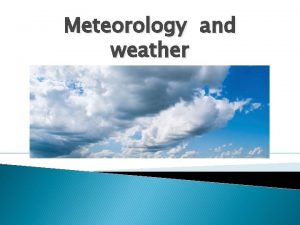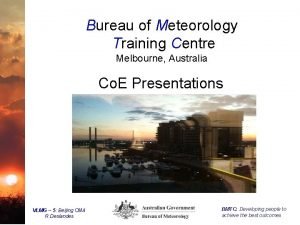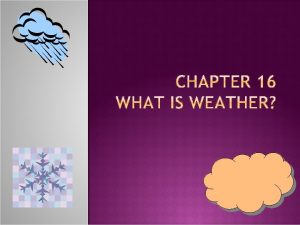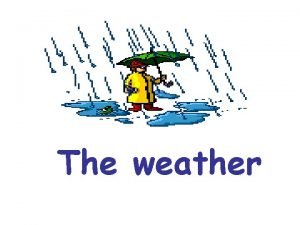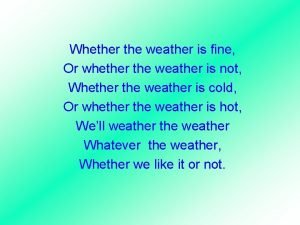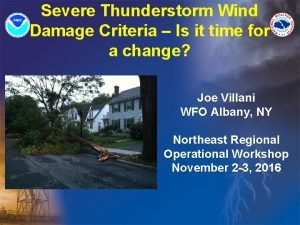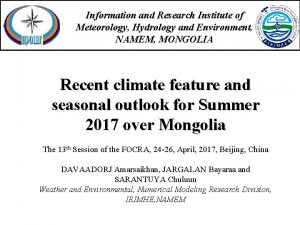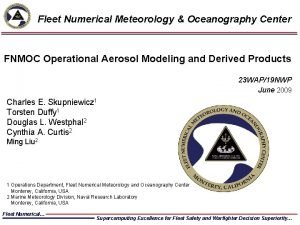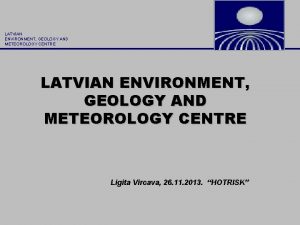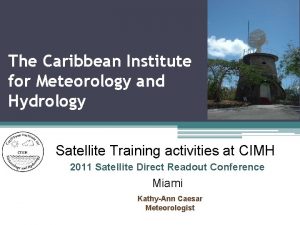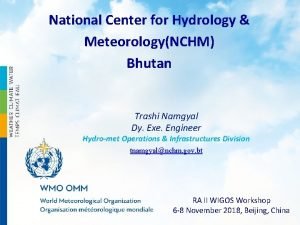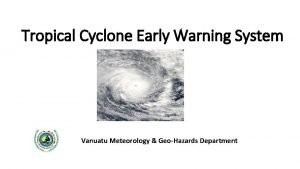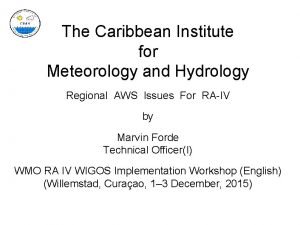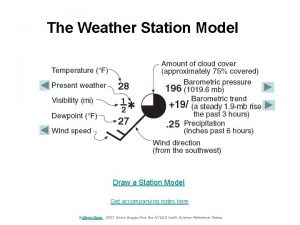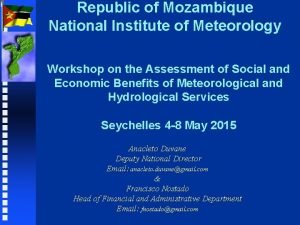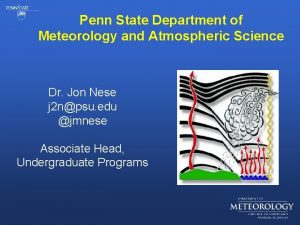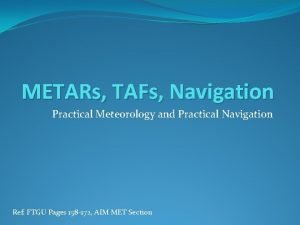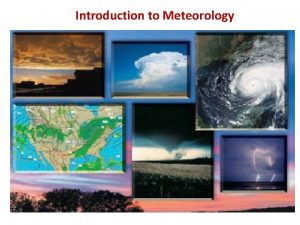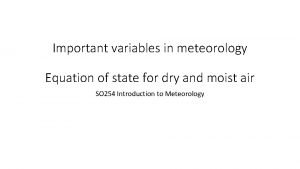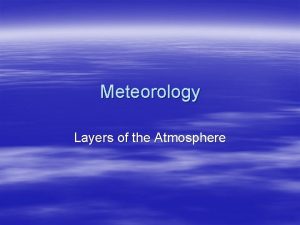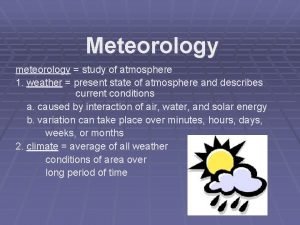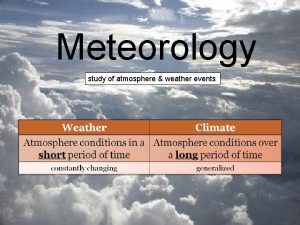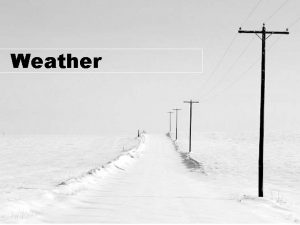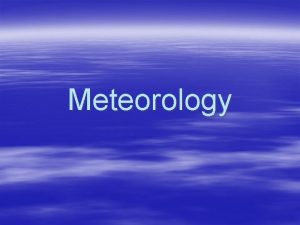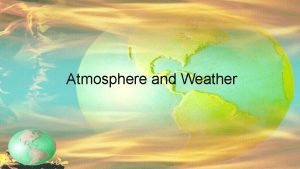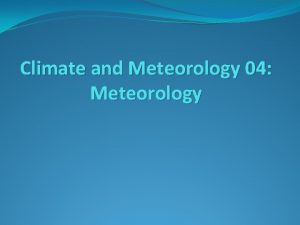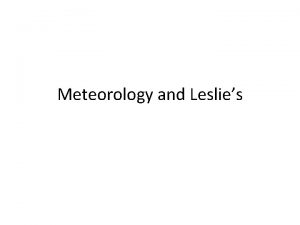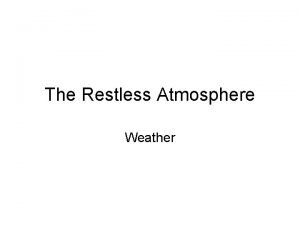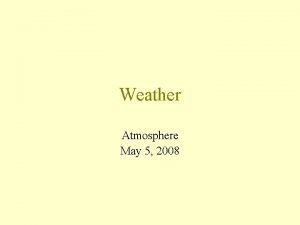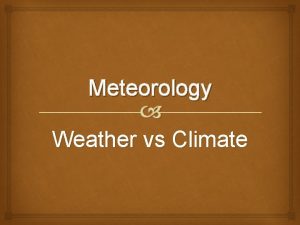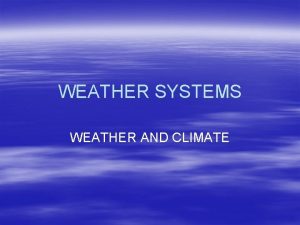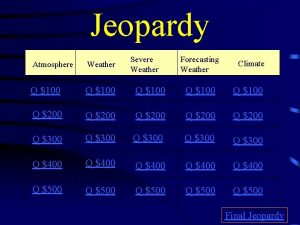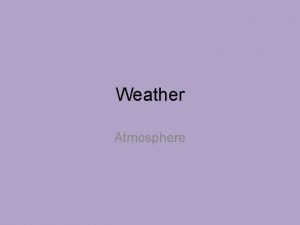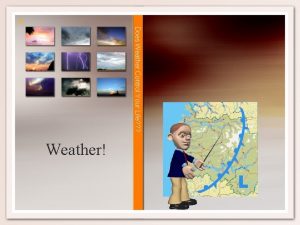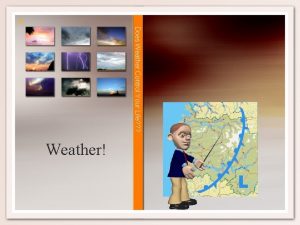Weather and the Atmosphere Meteorology Study of atmosphere
























- Slides: 24

Weather and the Atmosphere

• Meteorology– Study of atmosphere and the weather • Weather – Study of atmosphere at a given time and place, due to unequal heating of Earth’s surface

The Atmosphere

COMPOSITION OF TODAY’S ATMOSPHERE • • • 78 % Nitrogen 21 % Oxygen 0. 90 % Argon 0. 03 % Carbon Dioxide Traces of other gases, including water vapor (gas form of water)

Composition of the Atmosphere • ESRT Page 1

How Did The Atmosphere Form?

The Earth’s First Atmosphere To space Hydrogen Helium EARTH (roughly 4. 5 Billion years ago)

500 Million Years or So Later

OUTGASSING – release of methane, ammonia, Water Vapor, Carbon Dioxide and Nitrogen when the earth was cooling that made up Earth’s earlier atmosphere

Earth Cooled and Water Vapor Condensed to Form Oceans

• Most of the carbon dioxide dissolved in the newly formed oceans and … • then combined with other substances to form carboniferous sedimentary rocks (limestone and dolomite).

Nitrogen • Chemically inert • It remains in the atmosphere

Where did the oxygen come from?

CYANOBACTERIA – Found in Stromatolites

Cyanobacteria • Simple bacteria doing photosyntheses and releasing oxygen into the atmosphere • Over a billion years, the atmosphere began to change

Evidence • Banded Iron Formation – oxygen rusted iron in the sea, dates back 3. 5 billion years • Red Beds – rusted beds on land, dates back 2. 3 billion years

700 Million Years Later • With most of iron on Earth’s surface rusted… • …oxygen levels built up rapidly

A Few Million Years Later • Some of the oxygen was converted into Ozone (O 3) • a protective layer in stratosphere for life to develop on land

Evidence of increase in oxygen Earth Forms, H & He Atm. 4. 5 Banded Iron formations 4 Outgassing. Carbon Dioxide, Water Vapor & Nitrogen Formation Of Ozone Layer Red Bands 3 Cyanobacteria First appear – oxygen added to atm. 2 1 Now 78 % Nitrogen 21 % Oxygen 0. 90 Argon 0. 03 Carbon Dioxide Trace gases

Formation of Oceans • Large amounts of water vapor from early volcanoes eventually condensed • Condensation fell as rain which eventually formed our oceans • Comets may also have contributed to the water on the Earth

Layers of the Atmosphere • ESRT Page 14 Stratosphere – Ozone layer Troposphere – Where the weather happens

“pauses” • Where layers of atmosphere are separated. Temperature will change at the pauses (increase to decrease OR decrease to increase)


• http: //www. youtube. com/watch? v=Aka. Y 1 d v. Zer 4
 Meteorology study of
Meteorology study of Study meteorology australia
Study meteorology australia Weather refers to
Weather refers to Weather symbols for station models
Weather symbols for station models Whether the weather poem
Whether the weather poem Clothes poem
Clothes poem Sunny rainy cloudy windy stormy
Sunny rainy cloudy windy stormy Whether the weather is fine
Whether the weather is fine Heavy weather by weather report
Heavy weather by weather report Capital weather gang weather wall
Capital weather gang weather wall Meteorology hydrology and water management
Meteorology hydrology and water management Fleet numerical meteorology and oceanography center
Fleet numerical meteorology and oceanography center Latvian environment, geology and meteorology centre founded
Latvian environment, geology and meteorology centre founded Caribbean weather satellite
Caribbean weather satellite National center for hydrology and meteorology
National center for hydrology and meteorology Vanuatu meteorology and geohazards department
Vanuatu meteorology and geohazards department Caribbean institute for meteorology and hydrology
Caribbean institute for meteorology and hydrology Study jams conductors and insulators
Study jams conductors and insulators Station models
Station models Cisk meteorology
Cisk meteorology National institute of meteorology
National institute of meteorology Penn state university meteorology
Penn state university meteorology Metars tafs
Metars tafs Mesopause definition
Mesopause definition Equation of state for dry air
Equation of state for dry air
